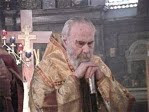A most significant act was Jesus's birth from the womb of a most holy woman, the Incarnation of God Himself. This was an act that transformed human life.
Metropolitan Bloom says,
How, through what acts of His life, did our Savior change the whole essence of our souls, or our lives?
First of all, by His very Nativity. That transformation of the human soul and life which He accomplished in Himself, was reflected in all its clarity in the town of Bethlehem. This little town in those days reflected the entire life of the whole human race. The life of man is a universal struggle for comfort and earthly advantages. The multitude of people who had gathered in Bethlehem was crowded into various dwellings on a cold night; probably the poor envied the rich in their comfort, the rich harshly drove unwanted lodgers out of their homes, and became angry when the overcrowding forced them unwillingly to share their accommodation with others. At least, that is how it always is when a lot of people are crowded together.
Looks what happens according to the customs of the new life. He to Whom all the houses, all the towns, and the whole universe belong, deprives Himself of the last human dwellings and takes up His abode together with beasts, committing Himself to an irrational manger instead of the throne of cherubim. O people! Is it for you to struggle and torment each other for preference in honor, cleanliness and comfort, when God does not spurn not being allowed in to where people are and is satisfied with an animal shed!
The Nativity of our Lord Himself shows us so much. First, we have the very act of the Incarnation of a man being born of woman with the seed of Spirit––without the normal sexual intercourse of man and woman. This is combined with humility that surrounds the circumstances of his birth. From the time of the first breath, He is showing us a new life––one that demands humility. He did not come as a king decked out in riches and cared for in a lavish palace. He came without the need for any special earthly goods, satisfied with the place of the animals for His first bed.
Metropolitan Anthony says,
And so, the new life in Christ consists in willingly renouncing worldly goods and not grieving when they are taken away by force. Perhaps you cannot direct your mind this way at once. But to the extent that you willingly deprive yourself of earthly enjoyments, however reluctantly: fast, offend yourself by giving to the poor or giving way to others, do not become angry or take revenge for oppression, but bear offenses in silence; -- to the extent that you crucify the old man in yourself -- to this extent will a new fount of grace-filled life flow out of your heart. "He that believeth on Me," says the Lord, "out of his belly shall flow rivers of living water: (Jn. 7,38). It is no longer either riches, or health, or glory, or the destruction of enemies that will make you rejoice, but, just as a farmer rejoices over a ripening field, or a hunter over a lot of wild fowl fluttering about, or an artist over the beauty of a sunset -- so you will rejoice over prayer, spiritual reading and the opportunity to be kind to your neighbor, either by giving, or consoling one who is grieving, calming one who is angry, or bringing a villain to his senses. The impious Jews did not want to accept this new life: they wanted earthly happiness, and the destruction of enemies, and human glory, and vain riches. It is the same thing which their foolish pupils want even now, Europeans of various nationalities, and many here in Russia. They have forgotten Christ, have come to hate Christ's abasement and love the treasures of the land of Egypt, not like the great Moses (Heb. 11:26), but "like the ancient foolish people in the wilderness".
In the Nativity we find the whole message of His life.
Metropolitan Anthony says,
Christ God taught us, brothers, to teach others not to seek for rights, but to renounce them, not to demand equality with the gentry, but self-abasement, not to fight, but to give way, not to commit crimes, but to bear offenses. This is how the manifest Sun of Righteousness "hath given us light and understanding" (1 Jn. 5:20), has opened for us the path to eternal and blessed life; this is what all righteousness in human society is based on.
Let's prepare and rejoice in the Nativity of Jesus Christ. Let's seek to learn from this most significant event. Let us glorify Him and rejoice in His coming.
Reference: SERMON ON THE NATIVITY OF CHRIST by Blessed Metropolitan Anthony, 1906
Reference: SERMON ON THE NATIVITY OF CHRIST by Blessed Metropolitan Anthony, 1906



